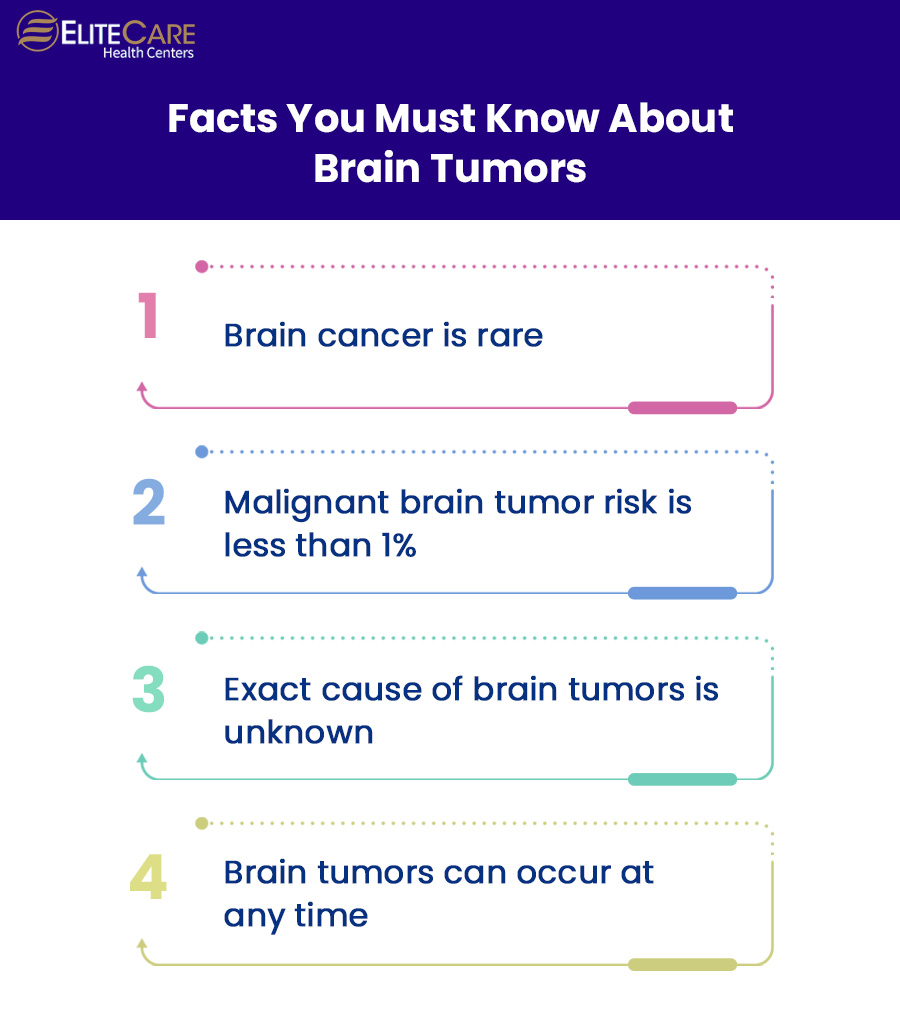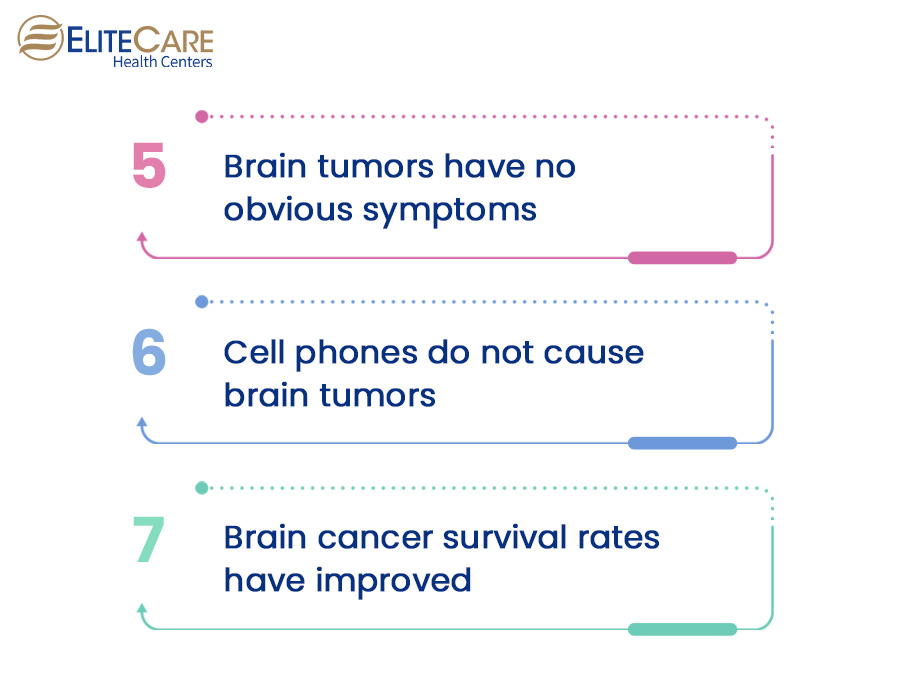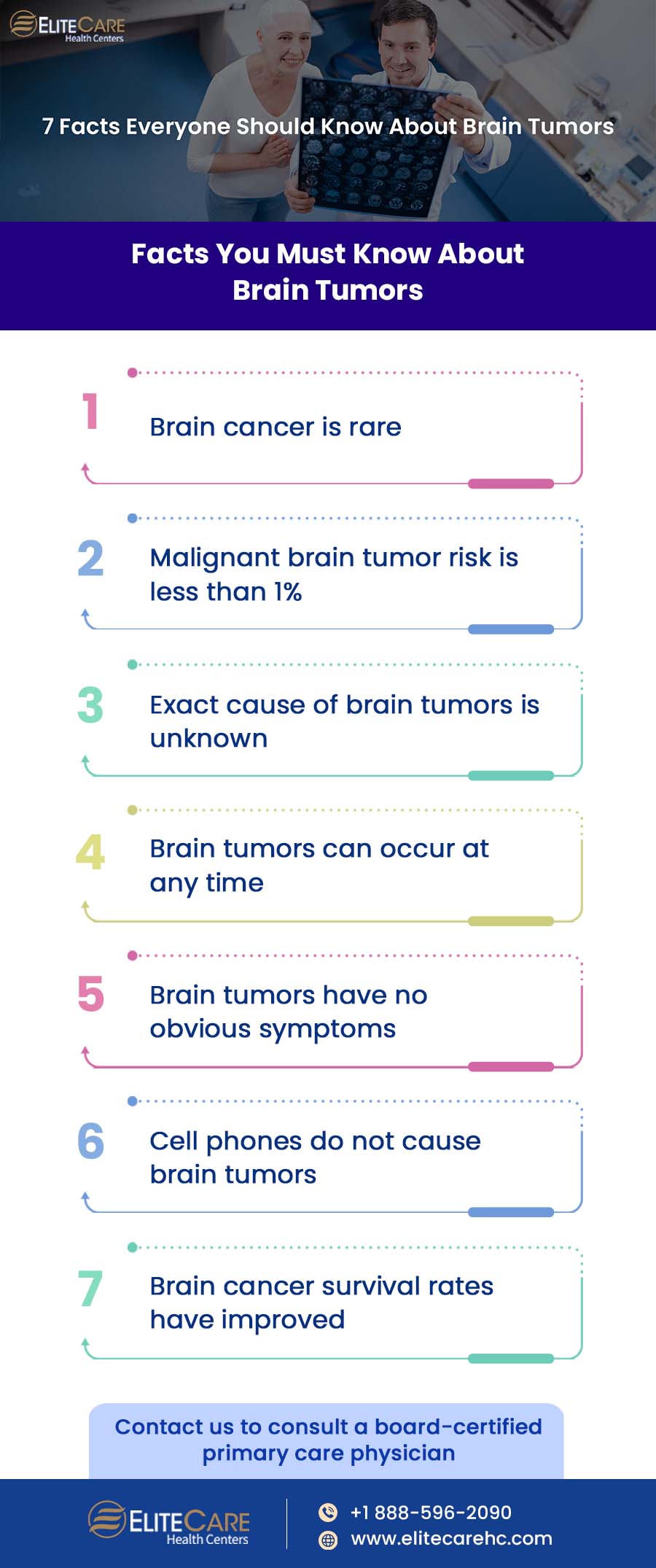
Brain tumors are abnormal growths that can occur within the brain or its surrounding tissues. These tumors can be either benign (non-cancerous) or malignant (cancerous) and can significantly impact an individual’s quality of life.
In this blog post, we will share a list of facts that will empower individuals with information about brain tumors. Read on to learn more.
Read More: How to keep your brain healthy as you age?
Things You Should Know About Brain Tumors

1. Primary brain cancer is rare
Unlike secondary brain cancer, primary brain cancer begins in the brain tissue. Compared to other organs or tissues in the body, the rate of cell division in the brain is relatively low. Besides, the brain is well-protected by the skull, which acts as a physical barrier, shielding it from external factors like exposure to carcinogens which may contribute to cancer development. Therefore, this type of brain cancer is relatively rare, accounting for less than 2% of all new cancer cases.
2. The lifetime risk of developing a malignant brain tumor is very low
The lifetime risk of developing a malignant brain tumor is relatively low compared to other types of cancer. According to the researchers, the average lifetime risk for developing a primary malignant brain and other central nervous system tumor is less than 1%.
3. There are no definite causes of brain tumors
The exact cause of most brain tumors remains unknown, and there is no single definite cause attributed to their development. Most brain tumors are sporadic, meaning they occur due to a combination of genetic and environmental factors. It may involve random genetic mutations, disrupting the regular growth of brain cells and leading to tumor formation.
Additionally, certain inherited conditions, such as neurofibromatosis type 1 and type 2, tuberous sclerosis, Li-Fraumeni syndrome, and von Hippel-Lindau disease, may increase the risk of developing brain tumors. Individuals who have received radiation therapy near the head for the treatment of previous cancers or certain non-cancerous conditions may be at a greater risk as well.
4. Brain tumors can occur at any age
While certain types of brain tumors may be more prevalent in specific age groups, brain tumors can occur at any age. Some brain tumors, such as medulloblastomas and pilocytic astrocytomas, are more commonly diagnosed in children. On the other hand, the risk of glioblastomas increases with age, with most cases diagnosed in individuals in their 20s, 30s, and 40s. Older adults are at greater risk of developing meningiomas.

5. Brain tumors do not produce any obvious symptoms
Brain tumors can present with a wide range of symptoms, and no single or definitive set of symptoms can specifically indicate their presence. While headaches are commonly associated with brain tumors, they are not always the primary or exclusive symptom. Headaches caused by brain tumors may have specific characteristics, such as being more frequent or severe in the morning or waking the person up from sleep.
In addition to headaches, brain tumors can cause a variety of neurological symptoms, which are as follows:
- Seizures
- Changes in vision (such as blurred vision or double vision)
- Difficulty with balance and coordination
- Speech difficulties
- Weakness or numbness in the limbs
- Cognitive and personality changes
- Problems with concentration and memory
Depending on the location and size of the tumor, additional symptoms, including persistent nausea or vomiting, changes in appetite, sleep disturbances, hormonal imbalances, etc., may arise. Therefore, it is crucial to consult a primary care physician immediately in case of any concerns.
6. Cell phones are not responsible for brain tumors
Numerous scientific studies have been conducted to investigate the potential link between cell phone use and the development of brain tumors. Recent scientific evidence does not support the claim that cell phones are responsible for causing brain tumors.
The radiofrequency electromagnetic fields emitted by cell phones are non-ionizing radiation. It means that they lack sufficient energy to break chemical bonds and directly damage DNA. Nonetheless, it is always recommended to follow guidelines for safe and responsible cell phone use, such as using hands-free devices or speakerphone options to minimize the effects of radiation.
7. Survival rates for brain cancer have been increasing
Brain cancer prognosis has improved over the years due to advancements in diagnosis, treatment, and supportive care. According to the American Cancer Society, the 5-year relative survival rate for primary malignant brain and central nervous system tumors has increased from about 22% in the early 2000s to about 36% in recent years.
With intraoperative imaging, neuro-navigation, and awake brain surgery, surgical techniques for brain tumors have significantly improved. These techniques not only help in extensive tumor resection but also minimize damage to healthy brain tissue.
Summing Up
Staying informed about these important facts is crucial for raising awareness, promoting early detection, and supporting those affected by this challenging condition. It is essential to stay updated on the latest research, advancements, and treatment options to actively participate in the decision-making process.
For any queries or concerns about brain tumors, contact a healthcare center and consult a primary care physician for detailed guidance. Contact EliteCare Health Centers, one of the best medical clinics in Florida to consult a board-certified primary care physician. We provide a wide range of senior care services including venipuncture, annual physical exams, and more!






